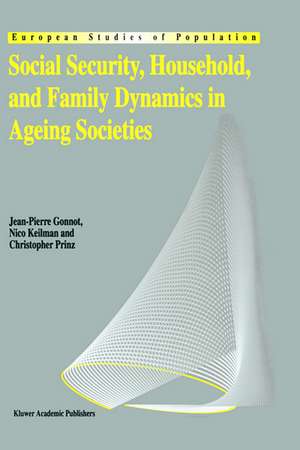Social Security, Household, and Family Dynamics in Ageing Societies: European Studies of Population, cartea 1
Autor Jean-Pierre Gonnot, Nico Keilman, Christopher Prinzen Limba Engleză Hardback – 28 feb 1995
This book analyzes the impact of dynamics in age structure and marital status composition on future public pension expenditures in twelve industrialized countries. It shows that there is no demographic response to population ageing at the horizon 2030. Neither an increase in fertility nor an inflow of migrants can rejuvenate national populations, unless fertility and/or migration reach unrealistically high levels. Therefore, the overall conclusion of this book is that demographic variables are of limited help to relieve the burden of future public pension expenditures. Substantial reductions of the public pension burden have to be sought in socioeconomic measures, and not in adjusting demographic conditions.
The book includes various demographic and pension scenarios for pension costs in the coming decades for Austria, Canada, the Czech and Slovak Republics, Finland, France, Germany, Hungary, Italy, the Netherlands, Norway, Poland, and Sweden. Not only old age pensions, but also disability and survivor pensions have been investigated. Variant projections were calculated for changes in demographic, labour force, and pension system variables. In addition, separate case studies for three countries deal with: a pension system in Austria in which benefits depend on the number children ever born; the impact of household dynamics on social security in the Netherlands, not just marriage and marriage dissolution; and with the consequences of economic growth for public pensions in Sweden.
| Toate formatele și edițiile | Preț | Express |
|---|---|---|
| Paperback (1) | 638.24 lei 6-8 săpt. | |
| SPRINGER NETHERLANDS – 4 dec 2010 | 638.24 lei 6-8 săpt. | |
| Hardback (1) | 644.49 lei 6-8 săpt. | |
| SPRINGER NETHERLANDS – 28 feb 1995 | 644.49 lei 6-8 săpt. |
Din seria European Studies of Population
-
 Preț: 231.11 lei
Preț: 231.11 lei - 18%
 Preț: 952.57 lei
Preț: 952.57 lei - 18%
 Preț: 951.47 lei
Preț: 951.47 lei - 18%
 Preț: 953.65 lei
Preț: 953.65 lei - 18%
 Preț: 957.44 lei
Preț: 957.44 lei - 15%
 Preț: 640.88 lei
Preț: 640.88 lei - 24%
 Preț: 799.81 lei
Preț: 799.81 lei - 18%
 Preț: 960.78 lei
Preț: 960.78 lei - 15%
 Preț: 635.80 lei
Preț: 635.80 lei - 15%
 Preț: 649.06 lei
Preț: 649.06 lei -
 Preț: 395.25 lei
Preț: 395.25 lei - 18%
 Preț: 951.29 lei
Preț: 951.29 lei - 18%
 Preț: 895.27 lei
Preț: 895.27 lei -
 Preț: 393.35 lei
Preț: 393.35 lei - 15%
 Preț: 593.91 lei
Preț: 593.91 lei - 15%
 Preț: 644.49 lei
Preț: 644.49 lei -
 Preț: 415.18 lei
Preț: 415.18 lei - 18%
 Preț: 946.10 lei
Preț: 946.10 lei - 15%
 Preț: 640.88 lei
Preț: 640.88 lei - 18%
 Preț: 951.29 lei
Preț: 951.29 lei - 15%
 Preț: 643.34 lei
Preț: 643.34 lei - 20%
 Preț: 554.98 lei
Preț: 554.98 lei -
 Preț: 383.12 lei
Preț: 383.12 lei -
 Preț: 383.12 lei
Preț: 383.12 lei - 15%
 Preț: 580.79 lei
Preț: 580.79 lei
Preț: 644.49 lei
Preț vechi: 758.23 lei
-15% Nou
Puncte Express: 967
Preț estimativ în valută:
123.32€ • 129.22$ • 101.95£
123.32€ • 129.22$ • 101.95£
Carte tipărită la comandă
Livrare economică 11-25 aprilie
Preluare comenzi: 021 569.72.76
Specificații
ISBN-13: 9780792333951
ISBN-10: 0792333950
Pagini: 252
Ilustrații: X, 238 p.
Dimensiuni: 156 x 234 x 19 mm
Greutate: 0.53 kg
Ediția:1995
Editura: SPRINGER NETHERLANDS
Colecția Springer
Seria European Studies of Population
Locul publicării:Dordrecht, Netherlands
ISBN-10: 0792333950
Pagini: 252
Ilustrații: X, 238 p.
Dimensiuni: 156 x 234 x 19 mm
Greutate: 0.53 kg
Ediția:1995
Editura: SPRINGER NETHERLANDS
Colecția Springer
Seria European Studies of Population
Locul publicării:Dordrecht, Netherlands
Public țintă
ResearchCuprins
1. Introduction.- 1.1. Background.- 1.2. Problem formulation and scope.- 1.3. Outline of this book.- 1.4. A synopsis of recent trends in living arrangements in industrialized countries.- 2. Modelling the dynamics of living arrangements.- 2.1. Options for living arrangements.- 2.2. Existing models for living arrangements.- 2.3. General aspects of the demographic models used in the project.- 2.4. Data for living arrangements models.- 3. Demographic changes and the pension problem: evidence from twelve countries.- 3.1. Introduction.- 3.2. Ageing and changes in living arrangements.- 3.3. Sociodemographic changes and the future of state pension systems.- 3.4. Assessing pension reforms.- 3.5. Conclusion: Ageing is certain but is the pension.- Appendix 3.1 Marital status projection model.- 4. Demographic changes and economic growth in pension systems: the case of Sweden.- 4.1. Introduction.- 4.2. Funded versus pay-as-you-go-systems: A theoretical note.- 4.3. The Swedish pension system.- 4.4. Demographic and economic changes and their effects on the Swedish pension system.- 4.5. Conclusions.- 5. Changing family structure and an emancipatory pension policy: the case of Austria.- 5.1. Introduction.- 5.2. Demographic model and data.- 5.3. A policy simulation tool.- 5.4. Female population structure.- 5.5. Cost-benefit analysis.- 5.6. Summary and discussion.- 6. Modelling the impact of changing household structure on social security in the Netherlands.- 6.1. Introduction.- 6.2. Model specification.- 6.3. From data to input parameters.- 6.4. User profiles for social security.- 6.5. Demographic scenarios for the Netherlands, 1986–2050.- 6.6. The effects on social security expenditure.- 6.7. Summary and conclusions.- 7. Conclusions and evaluation.- 7.1. General..- 7.2. Substantiveand methodological conclusions.- 7.3. Project assessment.- 7.4. Challenges for the future.- Appendix: Country case study reports.- The authors of this volume.















